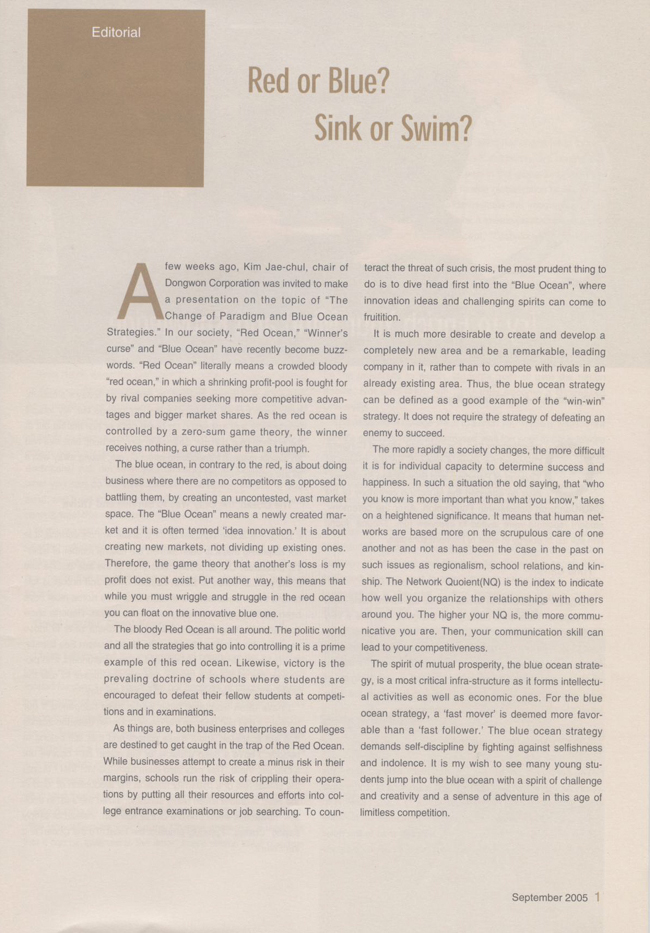
Red or Blue? Sink or Swim?
A few weeks ago, Kim Jae-chul, chair of Dongwon Corporation was invited to make a presentation on the topic of “The Change in Paradigm and Blue Ocean Strategy.” In our society, “Red Ocean,” “Winner’s curse” and “Blue Ocean” have recently become buzzwords. “Red Ocean” literally means a crowded bloody “red ocean,” in which a shrinking profit-pool is fought for by rival companies seeking more competitive advantages and bigger market shares. As the red ocean is controlled by a zero-sum game theory, the winner receives nothing, but a curse, not a rather than a triumph.
The blue ocean, in contrary to the red, is about doing business where there are no competitors as opposed to battling them, by creating an uncontested, vast market space. The “Blue Ocean” means a newly created market and it is often termed ‘idea innovation.’ It is about creating new markets, not dividing up existing ones. Therefore, the game theory that another’s loss is my profit does not exist. Put another way, this means that while you must wriggle and struggle in the red ocean you can float on the innovative blue one. The bloody Red Ocean is all around. The politic world is another nameand all the strategies that go into controlling it is a prime example of this of red ocean. the strategy of it is controlling. Likewise, the victory is the prevalingent doctrine of the schools that where students are encouraged the studentsto defeat their fellow students at competitions and in examinations.
As things are, both business enterprises and colleges are destined to get caught in the trap of the Red Ocean. While businesses attempt to create a minus risk in their margins, schools run the risk of crippling their operations by putting all their resources and efforts into college entrance examinations or job searching. To counteract the threat of such crisis, the most prudent thing to do is to dive head first into the “Blue Ocean”, where innovation ideas and challenging spirits can come to fruitition.
As the things are, both the business enterprises and colleges are destined to get caught in the trap named the Red Ocean. While the businesses attempted to take a risk of minus in margin, the schools bring crisis on themselves by their crippled operations in putting all into the college entrance examinations or job seeking. To cope with the crisis, all that we have to do is to run into the “Blue Ocean” with the idea innovation and challenging spirits.
It is much more desirable to create and develop a completely new area and be a remarkable, leading company in it, rather than to compete with rivals in an already existing area. Thus, the blue ocean strategy can be defined as a good example of the “win-win” strategy. It does not require the strategy of defeating an enemy to succeed.
The more rapidly a society changes, the more difficult it is for individual capacity to determine success and happiness. In such a situation the old saying, that “who you know is more important than what you know,” takes on a heightened significance. It means that human networks are based more on the scrupulous care of one another and not as has been the case in the past on such issues as regionalism, school relations, and kinship. The Network Quoient(NQ) is the index to indicate how well you organize the relationships with others around you. The higher your NQ is, the more communicative you are. Then, your communication skill can lead to your competitiveness.
The spirit of mutual prosperity, the blue ocean strategy, is a most critical infra-structure as it forms intellectual activities as well as economic ones. For the blue ocean strategy, a ‘fast mover’ is esteemed deemed more admirable favorable than a ‘fast follower.’ The blue ocean strategy demands self-discipline by fighting against selfishness and indolence. It is my wish to see many young students jump into the blue ocean with a spirit of challenge and creativity and a sense of adventure in this age of limitless competition.
[#268 Editorial]

